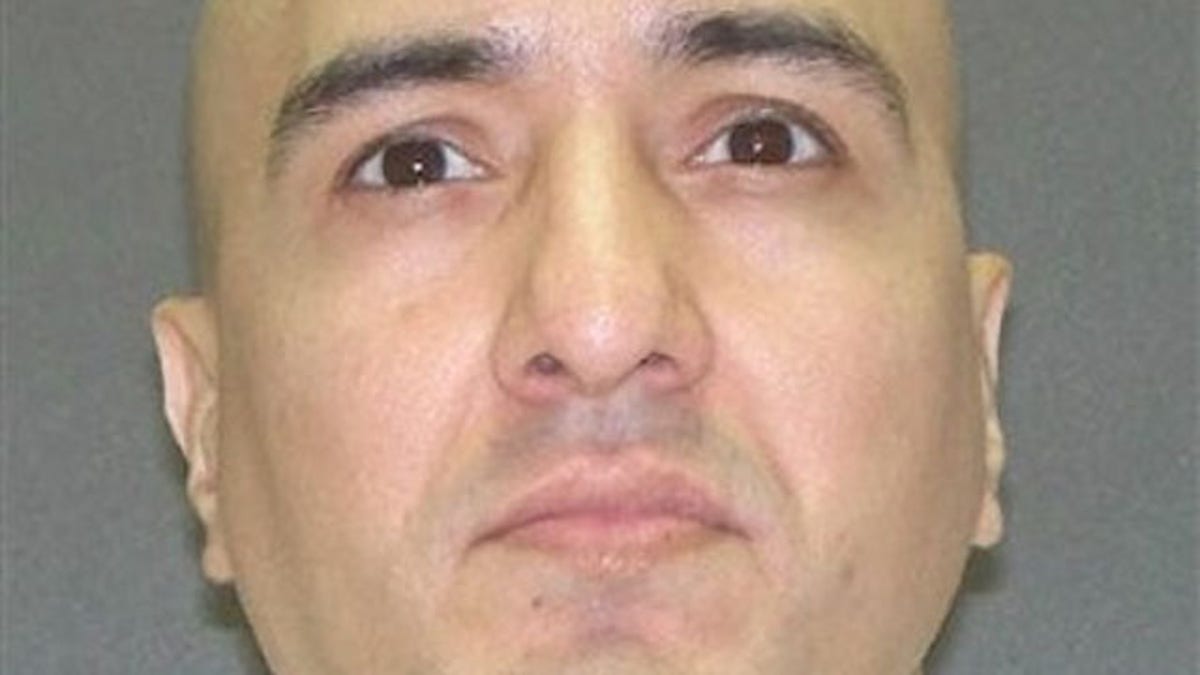
Peter Anthony Cantu is shown in this undated Texas Department of Criminal Justice handout photo. Cantu is the last of three men scheduled to die by lethal injection for the June 1993 murders of 14-year-old Jennifer Ertman and 16-year-old Elizabeth Pena (AP).
HUNTSVILLE, Texas -- Randy Ertman knows the road to the Texas death chamber too well.
He's set to make the trip again, to witness for the third time the execution of one of the gang members responsible for the rape and murder of his teenage daughter and her schoolmate.
This time, it will be the lethal injection on Tuesday of Peter Anthony Cantu, the leader of the five young men who were sentenced to die for the June 1993 murders of 14-year-old Jennifer Ertman and 16-year-old Elizabeth Pena.
It's not lost on him that Cantu has lived in prison longer than Jennifer and Elizabeth were alive.
"He should have been hung outside the courthouse," Ertman said in an interview with The Associated Press. "I don't mean this in a gruesome way, but if they want to make the death penalty a deterrent, up in front of (Houston) City Hall, they've got all these beautiful trees.
They should have hung them. If they hung all five of them, that would be a deterrent."
The case horrified Houston. Nearly two decades after friends and relatives frantically distributed flyers offering a $10,000 reward for help finding the teenagers who failed to return home from a summer pool party, prosecutor Donna Goode still has one in her office.
"Two beautiful young girls," Goode says. "I think about them."
Their battered and decomposing bodies, left to mummify in a wooded field in the relentless heat of Houston's summer, were found four days after they disappeared.
"They become everybody's daughter," recalled Don Smyth, a retired Harris County assistant district attorney who had helped prosecute Cantu. "Parents always worry about their kids, especially their daughters."
Of the six people convicted, five were sentenced to death. Two who were 17 when the girls were killed were spared the death penalty when the U.S. Supreme Court barred execution of people who were under 18 when they committed their crimes. The person not sentenced to death, 14 at the time, got a 40-year sentence.
Two of Cantu's companions in the gang they dubbed the Black and White preceded him to the death chamber.
Ertman made the drive here four years ago for the first execution. Derrick O'Brien, belted to a gurney, looked through the death chamber window at Ertman and other relatives of the girls and called his involvement "the worst mistake that I ever made in my whole life." Seven minutes later, O'Brien was dead.
In August 2008, Ertman again climbed the steps to the red-bricked Huntsville Unit prison. Mexican-born Jose Medellin, 33, with needles in his arms, also apologized. Nine minutes later, he was dead.
Ertman rejected an invitation from Cantu's lawyer to come to his office and read a letter of apology from Cantu.
"It's a little late," Ertman said. "I told him to stick it. Hell, no."
On that June night, the girls were hoping to beat an 11:30 p.m. curfew by taking a shortcut home to Pena's northwest Houston neighborhood. They were crossing a railroad bridge when the gang, drinking beer and initiating a new member, spotted them.
One of the gang members grabbed Pena. She screamed. Ertman tried to help.
In what police later would describe as a sadistic frenzy, the girls were gang-raped for more than an hour. They were forced to perform oral sex. They were kicked, teeth knocked out and hair pulled out and ribs broken. A red nylon belt, with an attacker tugging at each end, was pulled so tightly around Ertman's neck the belt snapped. Shoelaces were used to strangle Pena.
Evidence showed Cantu kicked one of the girls in the face with his steel-toed boot.
"The victims were so sympathetic and rightly so," said Robert Morrow, one of Cantu's trial lawyers. "Just a bad, bad case."
A tip led authorities to the bodies. And Cantu's brother, upset at the gang's gloating about having fun with the girls, called police.
Cantu, then 18, orchestrated the attacks and slaying. He became notorious for trying to kick a TV cameraman recording his arrest.
Because of repeated behavioral problems, Cantu had been in an alternative school since sixth grade. At age 11, he got caught stealing a bike from a younger boy. His offenses escalated to car theft and an attempted stabbing.
Authorities later linked him and O'Brien to a killing six months before the attack on Ertman and Pena. In that case, a 27-year-old woman was found at a Houston park with her throat cut. She'd been raped and eviscerated.
On death row, Cantu, now 35, was classified among the best-behaving inmates.
"He has matured remarkably," said Robin Norris, his appeals lawyer. "He's a guy who fully accepts his responsibility."
At his sentencing for the Ertman-Pena case, the judge asked Cantu if there was any reason the sentence shouldn't be imposed.
"Nah," Cantu replied. He has declined to speak with reporters as his execution date neared.
Court appeals to delay the punishment appeared exhausted. On Friday, the Texas Board of Pardons and Paroles refused his clemency petition.
Cantu, the first of five to be tried, convicted and condemned, will be the last to be executed.
Ertman will stand a few feet away, watching again through the window.









































